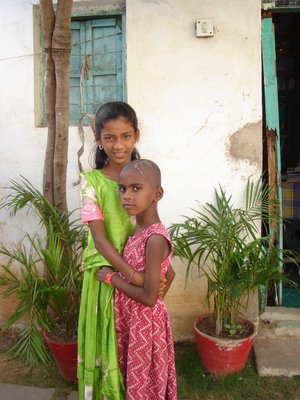
This little one is a new student in our pre-school class. She is our "Cinderella Story."
I first met her the first month school opened, one year ago. I was going around the slum one night recruiting students and talking to parents with my teachers. Early at night is the absolute best time to see the slum and the parents. That time of night there is a very happy time. So I was not surprised to see Premalata and her family, enjoying the night air, sitting out by the goat pens in the middle of one of the alleys.
Premalata (her name means love) is the younger sister of one of my outstanding 4th standard students, Bhandisha (her names means the sun). When I saw Premalata, who was clearly school-aged – seven years old or so - I was concerned that she wasn't coming to school with Bhandisha. Then her family told me that she was special. She did appear glassy-eyed, but blissful and happy. She did look like she had mild mental retardation. Fantastic, I thought, she can be a special needs student, like our Eliya. No, they told me, she had a medical condition. It was a benign brain tumor pressing on the left side of her brain. If it came out, she would be fine.
I sucked in my breath, stared at the ground, and tried not to react. I knew there was no way her parents would hesitate to help her, why had they not gone in for the operation? They had good reason to be extremely cautious about any medical anything. Government hospitals in India, which serve the poor, have a horrible reputations. The latest World Bank Development Policy Review for India states that 50% of the time, doctors in government hospitals recommend harmful treatments, and rarely even follow basic hygiene practices, like washing hands between patients. (see http://digitalmedia.worldbank.org/slideshow/SAR/English/india_dpr/ for a great multi-media slide show on the report)
Her parents didn’t even trust the diagnosis, even trust that there really was a tumor. After Dr. Arati looked at Premalata’s pre-surgical x-rays, she assured the parents this was a tumor and it needed to get out as soon as possible. Without any more delay, they took Premalata to the largest of the government hospitals. I had no idea they did this, I would have never let them go alone. But everything turned out great.
I saw Premalata six weeks after the operation. She was still weak and learning how to walk. Immediately, I noticed the look in her eyes was different. Her eyes were like little missiles seeking out stimulation, and her little hands fluttered to touched everything her eyes saw. She was still a blissfully happy little kid.
She is a walking, talking miracle. Modern medicine is amazing. She will grow up, get to have her own family…she has her whole life to look forward to now.
Last week, almost six months after the operation, she started attending the pre-school class. Premalata is a little embarrassed because she is about two feet taller than her classmates. But, she is sitting right next to her sister’s class so she can jump up and be next to Bhandisha whenever she feels overwhelmed. The outside world is still new to her. Premalata is a lucky girl to have such wonderful parents, we are so proud of them.
Comments
Post a Comment
Leave a Message